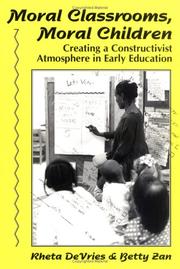| Listing 1 - 5 of 5 |
Sort by
|
Book
ISBN: 1472596498 147259648X 9781472596475 1472596471 9781472596468 1472596463 9781472596499 9781472596482 Year: 2016 Publisher: London
Abstract | Keywords | Export | Availability | Bookmark
 Loading...
Loading...Choose an application
- Reference Manager
- EndNote
- RefWorks (Direct export to RefWorks)
New Perspectives on Young Children's Moral Education explores how to approach young children's moral education in a world of uncertainty and change. What is moral education? How do young children learn to act and interact appropriately? How do we enable children to recognise that how they act and interact matters? How can character, virtues and value help young children internalise qualities associated with living 'a good life'? Challenging many current assumptions about ethics and education, Tony Eaude suggests that a moral dimension runs through every aspect of life and that ethics involves learning to act and interact appropriately, based on an 'ethic of care' and enduring qualities and attributes, to equip children to resist strong external pressures. Drawing accessibly on research in neuroscience and psychology, he discusses how young children learn, highlighting the role of emotion, culture, example, habituation and feedback. Small actions can help to develop agency, empathy and thoughtfulness and a sense of moral identity, with an increasing emphasis on self-regulation, a vocabulary of ethics and intrinsic motivation. Eaude explores how character, virtues and values can help young children and adults to recognize and internalize qualities associated with living 'a good life'. He identifies how adults and learning environments can support these processes and shows why an inclusive approach is needed, rather than focusing on these topics only in particular settings, programmes or lessons. Recognising pitfalls and dilemmas, Eaude argues that an approach based on virtue ethics and an apprenticeship model is suitable in school and other settings, both religious and otherwise, internationally.
Book
ISBN: 178450307X Year: 2017 Publisher: Jessica Kingsley Publishers
Abstract | Keywords | Export | Availability | Bookmark
 Loading...
Loading...Choose an application
- Reference Manager
- EndNote
- RefWorks (Direct export to RefWorks)
The development of new policy on the British Values and the Prevent Duty in the early years has raised many questions about appropriate implementation. As a formal part of the Early Years Foundation Stage, educators are now required to deliver this instruction in classrooms, nurseries, and other early years settings. In response, Kerry Maddock has established an informed practitioners guide with strategies to interpret and implement this legislation into the early years environment. Through case studies, research, and interviews with OFSTED inspectors, the author provides a detailed explanation of the Prevent Duty, as well as what the government means by promoting fundamental British values and sets our clear guidance and an in-depth framework in delivering these in every day practice. A combination of early childhood philosophy with educational policy expertise, make this an essential handbook for professionals working in an early years setting.

ISBN: 0807733415 Year: 1994 Publisher: New York (N.Y.) : Teachers college press,
Abstract | Keywords | Export | Availability | Bookmark
 Loading...
Loading...Choose an application
- Reference Manager
- EndNote
- RefWorks (Direct export to RefWorks)
Book
ISBN: 195233117X Year: 2023 Publisher: Washington, DC : National Association for the Education of Young Children,
Abstract | Keywords | Export | Availability | Bookmark
 Loading...
Loading...Choose an application
- Reference Manager
- EndNote
- RefWorks (Direct export to RefWorks)
Affective education. --- Conduct of life --- Moral education (Early childhood) --- Preschool teachers --- Respect for persons --- Social skills --- Study and teaching. --- Training of. --- Study and teaching (Early childhood)
Book
ISBN: 3319755595 3319755587 Year: 2018 Publisher: Cham : Springer International Publishing : Imprint: Springer,
Abstract | Keywords | Export | Availability | Bookmark
 Loading...
Loading...Choose an application
- Reference Manager
- EndNote
- RefWorks (Direct export to RefWorks)
This book is about values education in early years settings and discusses theory and concepts, as well as methodological and empirical perspectives. It explores issues such as the kinds of values that are communicated between educators and children and the kind of future citizens we foster in early childhood settings. It illustrates by way of cases involving many participants, including children, educators, and researchers, who have their roots in diverse contexts, and reside in different parts of the world, including Australia, Denmark, Finland, Iceland, Norway, Slovenia, and Sweden. The book carefully considers the contextualized character of the cases presented, yet argues that the questions, theories, and methodologies emphasized do inform the international debate in manifold ways. Communication of values in a broad and diverse sense is central in any pedagogy, especially for the youngest children in the educational system. Still, values education has been neglected as a research field, in education in general and particularly in the early years. This book addresses this lack of knowledge by scrutinizing various questions about values education in ECEC settings. .
Education. --- Educational sociology. --- Teaching. --- Education --- Education and sociology. --- Sociology, Educational. --- Early Childhood Education. --- Educational Philosophy. --- Teaching and Teacher Education. --- Sociology of Education. --- Philosophy. --- Education and sociology --- Social problems in education --- Society and education --- Sociology, Educational --- Sociology --- Didactics --- Instruction --- Pedagogy --- School teaching --- Schoolteaching --- Instructional systems --- Pedagogical content knowledge --- Training --- Children --- Education, Primitive --- Education of children --- Human resource development --- Schooling --- Students --- Youth --- Civilization --- Learning and scholarship --- Mental discipline --- Schools --- Teaching --- Aims and objectives --- Early childhood education. --- Moral education (Early childhood) --- Social values --- Early childhood education --- Study and teaching (Early childhood) --- Social aspects. --- Child development. --- Education—Philosophy. --- Educational sociology . --- Child study --- Development, Child --- Developmental biology --- Development --- Teachers --- Training of. --- Teacher education --- Teacher training --- Teachers, Training of
| Listing 1 - 5 of 5 |
Sort by
|

 Search
Search Feedback
Feedback About UniCat
About UniCat  Help
Help News
News